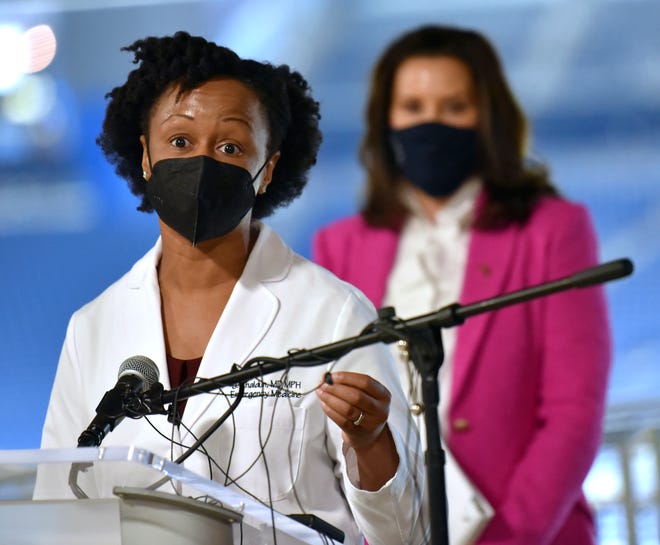Joneigh Khaldun leaving post as Michigan's top doctor
 Craig Mauger
Craig MaugerDr. Joneigh Khaldun, Michigan's chief medical executive and a key adviser for the state's response to COVID-19, is leaving her post 18 months into the pandemic, Gov. Gretchen Whitmer's office announced Friday.
Khaldun has accepted a new position to pursue "an opportunity outside of state government," which will be announced in the coming weeks, the governor's office said. Dr. Natasha Bagdasarian, who currently works for the state health department, will serve as chief medical executive beginning on Oct. 1.

"Thanks to Dr. J’s around-the-clock leadership, our state acted quickly with the best available data and science to slow the spread of COVID-19 and save countless lives during the pandemic," Whitmer said in a press release. "Michigan has one of the lowest number of cases per capita, and numerous studies show that the tough decisions we made helped save thousands of lives."
Khaldun is the second high-ranking health official in Michigan to depart during the pandemic. The first was Robert Gordon, who stepped down as the state's health director on Jan. 22 after internal disagreements about how to respond to the virus.
In August, Khaldun showed some level of disagreement with the governor's stance on not requiring masks in schools as a statewide mandate. Khaldun told reporters that she advised Whitmer's administration that a statewide requirement for students to wear masks would likely help combat the spread of COVID-19. Khaldun said her "lane" was to provide public health guidance and there are "many other things" to be considered. Asked what those things were, she responded that she couldn't say "at this time."
Amid concerns about growing infection rates among young people, Whitmer has left the decision on whether to require masks up to local school districts and county health departments.
"When you’re in medicine and public health, you just do what’s best based on science and data," Khaldun told The Detroit News in March. "You don’t let other things judge how you act.”
The state will conduct a nationwide search to select a permanent chief medical executive. But Bagdasarian, who will at least temporarily fill the role, has worked in Michigan and internationally for the last decade, writing 40 publications on topics in infectious diseases and public health, according to the governor's office. For the last year, she has served as the state's senior public health physician, overseeing COVID-19 testing strategy.
Khaldun, who still practices as a specialist in emergency medicine at the Henry Ford Health System in Detroit, has been a central figure in Michigan's response to the COVID-19 pandemic, frequently appearing at press conferences and explaining the state's actions to try to stem the spread of the virus. She is believed by the state Department of Health and Human Services to be the first African American chief medical executive in Michigan.
Khaldun appeared at the press conference on the evening of March 10, 2020, when the state reported its first cases. At the time, Khaldun said the state learned of the presumed positive results "a couple of hours" before the 10:45 p.m. broadcast when the news was revealed.
"Her leadership, consultation, determination and candor have been invaluable in guiding the decisions that have always been in the best interest of keeping Michiganders safe and healthy," said Elizabeth Hertel, the director of the state health department who succeeded Gordon. "She has served in multiple roles in the interest of public service throughout her medical career, and no matter where her journey takes her we know it will be to continue to be a champion of community health."
Gordon, the former state health director, abruptly resigned in January after Whitmer told him it was time to go in a "new direction." The governor made the move as she announced an order reopening indoor dining at restaurants. Gordon had crafted a more cautious approach to reopening than what Whitmer unveiled in January, according to internal emails released through open records requests.
Khaldun has been a trusted voice during the pandemic for Michigan’s African American community, which was hit harder by the virus than other groups during the early months of the pandemic, supporters have said.
Blacks accounted for about 40% of deaths at the beginning of the pandemic while accounting for 14% of Michigan's population. COVID deaths among African Americans had fallen to 22% after a task force that included Khaldun and Lt. Gov. Garlin Gilchrist sought to address the disparity.
Khaldun came to the Whitmer administration from Detroit Mayor Mike Duggan's health department, where the city in 2017 experienced its first cases of what would become Michigan's largest hepatitis A outbreak in modern history. She set up a vaccination clinic within 24 hours, worked to increase public messaging and community outreach on the sickness, and recruited primary care physicians to help in the effort.
The outbreak of the highly contagious liver infection virus — contracted through close contact with an infected individual, or contaminated food or water — was a small foreshadowing of what would come three years later, when the coronavirus pandemic gripped the state about a year into Khaldun’s tenure as Michigan’s chief medical executive.
cmauger@detroitnews.com